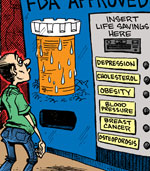Vitamin C- A Key Ingredient for a Healthy Life
| Share on Facebook | Share on Twitter | Share on Google+ |
A Key Ingredient for a Healthy Life
It is also known as ascorbic acid which means "without scurvy", a disease that can occur as a result of a deficiency.
Unlike other animals, the human body cannot produce its own supply of vitamin C, and so we must ensure that we get adequate amounts of this nutrient from our daily diet.
As ascorbic acid is a water-soluble vitamin it is stored only in restricted amounts in our body's tissues. Excess amounts can be ejected from the body through our urine, and so this vitamin is rarely related with toxicity.
The Benefits of Vitamin C

- A Collagen Maker
Ascorbic acid plays a crucial role in the formation of collagen, which is the primary substance that holds the body together by binding the cells to form tissues. It is present in every part of our body, including our bones, skin, tendons, cartilage, blood vessels, and teeth.
The disease called scurvy that can arise from a deficiency of this vitamin is caused by breakdown of the collagen tissue throughout the body, which causes blood vessels to weaken and leak, bones and connective tissues to weaken and causes the skin to sag.
- A Potent Antioxidant
This vitamin is an important antioxidant that protects our bodies from the free radicals that damage the cells and weaken the immune system and are the major cause of aging and disease.
Ascorbic acid also works in conjunction with vitamin E and the enzyme glutathione peroxidase to minimize the oxidative damage to DNA and other molecules.
It also helps to prevent heart attacks since the bad cholesterol, called LDL, becomes harmful only when damaged by free radicals.
- Helps in the treatment of anemia, as it helps in the absorption of iron.
- Helps delay or prevent the formation of cataracts, as research indicates that low vitamin C levels are associated with an increased risk of cataracts.
- Protects against many forms of cancer.
- Prevents the accumulation of the toxic mineral lead.
- Can be used in the prevention and treatment of the common cold.
Other Benefits of Vitamin C
Where Can I Find Vitamin C?
This vitamin is plentiful in many foods. Some of the best sources include: Citrus fruits such as oranges, limes, grapefruit, tangerines, and lemons. Green and leafy vegetables, including tomatoes, green peppers, cauliflower, potatoes and peas.
Be aware, however, that ascorbic acid is easily destroyed by heat, water, air, cooking, light and smoking.
What Causes a Deficiency of Vitamin C?
Why is it becoming more and more difficult to obtain sufficient amounts of vitamin C through diet alone? Because the nutrient content of fruits and veggies is decreasing with every passing day due to modern farming methods which deplete the soil. Other factors, including the excessive processing and refining of foods, certain storage and cooking methods, all result in a serious reduction in the nutritional quality of our food sources.
The Symptoms of a Vitamin C Deficiency
A serious deficiency of vitamin C leads to scurvy. Poor wound healing, bleeding gums, and easy bruising are the major symptoms of this condition and, if untreated, it can eventually lead to death.
But though most of us consume enough of this vitamin to avoid this disease, our bodies frequently do not have enough to allow our bodies to function optimally, which causes various diseases in the long term.
Since vitamin C plays an important role in preventing many illnesses, a lack of this vitamin is associated with the development of such diseases as heart disease, stroke, cancer, and some infectious diseases.
Choosing Vitamin C Supplements Wisely
Adding ascorbic acid as a supplement to your daily diet seems is a sensible decision due to the decreased nutrient quality of the food we consume. Here are some tips and precautions to help you choose the right vitamin C supplement for you.
The Right Dosage
The RDA (Recommended Daily Allowance) for this vitamin is 60mg but many health experts recommend a 500 mg dose, especially if you are at risk of a specific health condition. If you want to promote your general health with a multi-vitamin or nutritional supplement product, 40 to 60 mg of ascorbic acid would be a reasonable amount in the formula.
- Synergy with Other Nutrients
Vitamin C is more effective if the supplement also contains bioflavonoids, hesperidin, rutin , calcium and magnesium. Ascorbic acid also increases the effectiveness of vitamin E, which is another antioxidant vitamin.
Therefore, choosing a scientifically formulated nutritional supplement that contains the appropriate amount of ascorbic acid along with other essential nutrients can increase the health benefits of all the nutrients it contains.
- Buying from a Trustworthy Manufacturer
The supplement industry is only loosely regulated in the U.S., and buying a good supplement product can be a bit like gambling with your health. Some products do not even contain the active ingredients listed on the label, and others contain less or more than the amounts stated. Even worse, some of them include other substances that could be harmful to your health.
In order to ensure the purity and the quality of the product you are buying, choose a manufacturer that follows the pharmaceutical GMP compliance, which is the highest standard available, and will ensure that manufacturing and quality control procedures were adhered to.
More Vitamin C Related Articles
Vitamin C Deficiency - What are symptoms of vitamin c deficiency?
Buffered Vitamin C - What are the benefits of buffered vitamin C?
Vitamin C and Cancer - Is vitamin C beneficial in cancer treatment?
Vitamin C and Weight Loss - Does vitamin C boost weight loss?
Vitamin C Foods - What are the foods high in vitamin C?
Vitamin C for Colds - How to treat your cold with vitamin C?
What is Vitamin C - What Does Vitamin C Do For Your Body? What is vitamin C used for?
Liposomal Vitamin C - What are the health benefits liposomal vitamin C?
Lyo-Spheric Vitamin C - Why do you need Lyo-Spheric vitamin C?
Vitamin C and Pregnancy - Is it safe to take vitamin C supplements during pregnancy?
Vitamin C Overdose - How much vitamin C is too much?
Vitamin C Benefits - What are some health benefits of vitamin C?
-
Skin CareMen Skin Care
-
Free ResourcesFree eBooks
-
A good laugh and a long sleep are the best cures in the doctor's book.Irish Proverb
-
Featured Health Supplement
 If you find a product that is as effective as Total Balance, and is better value for money, let us know and we will give you a refund equivalent to your entire purchases of Total Balance…retrospective.
If you find a product that is as effective as Total Balance, and is better value for money, let us know and we will give you a refund equivalent to your entire purchases of Total Balance…retrospective.
-



















